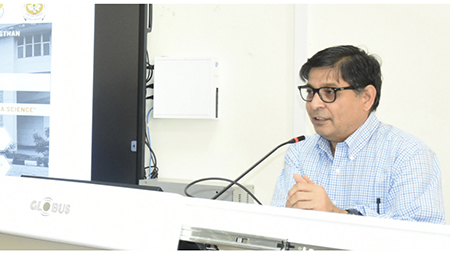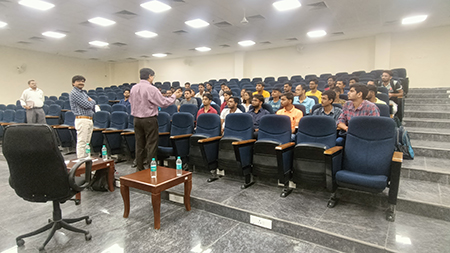- YouTube
- TikTok
OU professor shares data science expertise through Fulbright Specialist Program

Oakland University Professor Ravi Khattree recently traveled to India to share his expertise on the dynamic and ever-expanding field of data science.
Dr. Khattree, a professor of applied statistics and co-director of OU’s Center for Data Science and Big Data Analytics, was invited to the Central University of Rajasthan as part of the Fulbright Specialist Program, a U.S. State Department initiative that allows U.S. academics and established professionals to engage in project-based exchanges at host institutions around the world.
For two weeks this summer, Dr. Khattree delivered a series of lectures on the theme of “Quantitative Aspects of Data Science.” The goal was to introduce more cutting-edge topics in the statistics curriculum at the undergraduate and graduate level at the University of Rajasthan, emphasizing quantitative thinking in future course development and providing an interdisciplinary quantitative exposure of data science by incorporating the three quantitative fields of statistics, mathematics and computer science.
Lecture topics included basic and advanced graphical methods, data cleaning techniques (which involve detecting and correcting errors in data collections) and designs for data collections. Dr. Khattree explained that such topics have taken on greater relevance as society continues to generate massive amounts of data.
“In today’s world, data are everywhere. In fact, it was stated that thanks to computer advances, more data were generated in 2003 alone than in the entire history of humankind,” said Dr. Khattree. “This development gave rise to the need for techniques and hence a separate discipline, which could handle vast amounts of data. Data Science is a relatively new discipline dealing with all aspects of data, which borrows ideas, techniques and approaches from statistics, computer science and mathematics and attempts to fulfill this need.”
Dr. Khattree also spoke to undergraduate statistics majors, offering career and academic advice during an hourlong question-and-answer session. |
Along with the lectures, Dr. Khattree had several mentoring sessions with undergraduate and graduate students and met with several junior and senior faculty members for one-on-one research discussions. Dr. Khattree also had a session with the Vice Chancellor of the university, Professor Anand Bhalerao, to exchange ideas about the development of the university and statistics program. He also gave a university-wide general interest talk titled “Ancient Hindu/Jain Configurations and Their Scientific Applications in Industrial and Biomedical Experiments” for the non-technical audiences.
Dr. Khattree noted that Central University of Rajasthan is one of the more recently established Indian universities wholly funded by India’s central government (instead of being funded by individual states) with an exclusive emphasis on cutting edge STEM disciplines. The university’s Department of Statistics wanted to bring established and well known data scientists to introduce the field's latest advances to students and faculty members.
“Sharing the knowledge with institutions of other countries not only promotes cultural understanding,” said Dr. Khattree, “but also gives both sides an opportunity to improve their education and research efforts by incorporating newer ideas and developing collaborative projects.”


 September 16, 2022
September 16, 2022